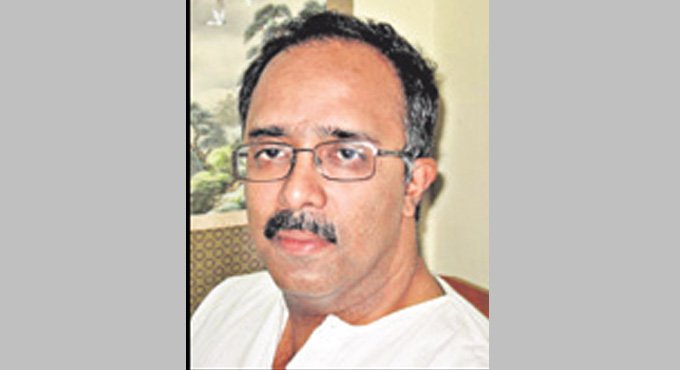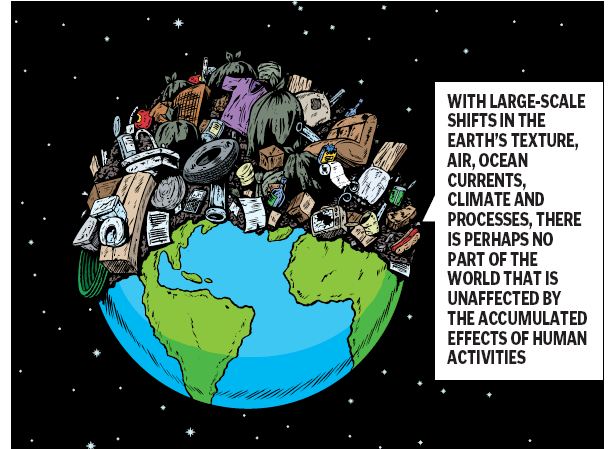There is no there there
Wasteland was what home was not but is creeping in now with impossible pollution levels and progressive desertification

In a stunning essay on the transformation of the foundational materials – the four elements – media studies theorist Gary Genosko writes:
EARTH: dust; WATER: blood; AIR: lethal fogs; FIRE: flammables. Wrapped around these elements is the planetary phylum, a great tellurian cable bunch with its own products: EARTH: electronics; WATER: liquidities like water bottled in plastic, which throws forward diagrammatic intensities in the explosion of plastic debris; AIR: gases (greenhouse); and FIRE: smouldering car tyres, slashed rainforests and seasonal wildfires in the great northern forests.
Genosko is fascinated by the transformation of elements humans assumed were natural. He notes how ‘blood [is] mixed with dust in the extraction of conflict minerals and oil fields, or methane, a flammable unnaturally mingled with the water supply’. Blood has become, as he notes, ‘a general liquid of exchange [that] extends beyond the human to the mountain gorillas butchered for bushmeat to feed the armies and labourers engaged in “freelance” mining operations. There are no natural elements any more.
The Post-natural
When one looks at contemporary eco-disasters – Bhopal, Fukushima, to name but two – we see the Genosko argument materialising. In the face of overwhelming contamination and mixing of toxic materials into the ‘natural’ world, we have entered the phase of the post-natural.
This indicates not just a temporal phase, where the ‘post’ implies an ‘after’. Rather, the ‘post’ in post-natural is a different conceptualisation of the natural itself. We recognise that whatever we have called ‘natural’ is the result of a human-made language and classificatory system: that, there is ‘natural’ and this, here is ‘culture’ (meaning: of human origin). That is, whatever we defined as ‘Nature’ is a set of terms, meanings and interpretations put in place by humans. Whether non-human life forms think in terms of Nature and Culture is an unthinkable question, limited as we are by our abilities and frames of interpretation.
In the contemporary era, with large-scale shifts in the earth’s texture, air, ocean currents, climate and processes, there is perhaps no part of the world that is unaffected by the accumulated effects of human activities across history (commonly called the Anthropocene today). The pristine untouched Nature out there is just a myth. Weather conditions, tides, temperatures have changed around the world, bringing home to everyone on the planet the sense of a connected planet, a planetary consciousness. This too is post-natural.

New Wildernesses
One consequence of the post-natural creeping up on us is the irreducible acceptance of newer and newer sites of the wilderness. Think of the areas around Pripyat, for instance. The images of barren lands, vast and inhospitable (although some communities have returned to eke out a living), where little grows, rendered wasted by Chernobyl’s disastrous explosion decades ago, only produce a sense of desolation.
The post-natural wilderness, which the critic Rebecca Raglon defines as ‘dangerous areas where humans are excluded … human exclusion from these areas that makes them wilderness reserves’ is a global condition now. Such a wilderness – the stuff of post-apocalyptic fiction and film – is commonplace enough and speaks of the geological history of human activities.
In these wildernesses, those humans who survive are essentially survivors and scavengers in many of these filmic-fictional texts. Take as an instance, the description of such a wilderness in Jeff VanderMeer’s new novel, Borne:
“Behind us lay the warren we lived in and in front of us, way down below, veiled by a protective skein Wick had made to shield us from unwelcome eyes, the writhings of the poisonous river that ringed most of the city. A stew of heavy metals and oil and waste that generated a toxic mist, reminding us that we would likely die from cancer or worse. Beyond the river lay a wasteland of scrub. Nothing good or wholesome there, yet on rare occasions people still appeared out of that horizon.”
Or the opening sections of Margaret Atwood’s Oryx and Crake:
“On the eastern horizon there’s a greyish haze, lit now with a rosy, deadly glow. Strange how that colour still seems tender. The offshore towers stand out in dark silhouette against it, rising improbably out of the pink and pale blue of the lagoon. The shrieks of the birds that nest out there and the distant ocean grinding against the ersatz reefs of rusted car parts and jumbled bricks and assorted rubble sound almost like holiday traffic.”
The wilderness here is manufactured, the tragic end-product of human history. Detritus and rubble mark the land, and toxins, the waters. In the post-wilderness the air, water, earth and fire have all been transformed into some unclassifiable, toxic elements-that-are-no-longer-elements.
What New Frontiers, then?
In the 18th and 19th centuries, the wilderness was where intrepid (and, let us not deny, protocolonial, full-fledged capitalists) explorers went to. Africa, southern America, the jungles of East Asia were wildernesses meant to be conquered by the white man.
He – it was severely gendered – ‘discovered’ the natives in these places (although the natives always knew they were there, having lived in the place for centuries!), described, catalogued and eventually colonised them. The wilderness across the seas on a different continent was the test of the European’s masculinity, his will-to-power. The wilderness constituted the limits of his imagination and his fantasy, his quest for the exotic and his escape route from the boredom of everyday life. The wilderness and the natural was out there.
In the contemporary imagination that is embedded in the history of industrial disasters and pollution, in the accumulation of acres of waste, the urban, the suburban and the outlier sector of the metropolis are the frontiers. The wasteland was exactly what home was not: outside, inhospitable, barren. Now the wilderness creeps in upon us, as the wastelands come closer.
Cormac McCarthy, Margaret Atwood, Jeff VanderMeer all point to the desertification that is no longer out there, but has begun to penetrate our inner cities. This creeping wilderness is the rendering inhospitable, incrementally, of the earth, water and air on which the cities thrive and humanity survives.
Gertrude Stein once said of her once-home: ‘there is no there there’. Today we can see, watching the wasteland come closer with impossible pollution levels and progressive desertification: ‘there is no here here: the there is here’.
(The author is Professor, Department of English, University of Hyderabad)
Now you can get handpicked stories from Telangana Today on Telegram everyday. Click the link to subscribe.
Click to follow Telangana Today Facebook page and Twitter .
Related News
-
Growing evidence points to Khamenei’s death, says Netanyahu
7 hours ago -
De-escalate, respect sovereignty: India as West Asia tensions soar
8 hours ago -
Rewind: Kaleshwaram’s Treasures — Temples, Tussar, Three Rivers
8 hours ago -
US, Israel launch major assault on Iran; Tehran retaliates
8 hours ago -
Role of NGOs in shaping education and nutrition in India
9 hours ago -
HCA elections for posts of secretary, treasurer on March 12
9 hours ago -
Bindass Women Run to be held in Hyderabad on March 1
9 hours ago -
Illegal sand extraction near Annaram barrage pillars raises safety concerns
9 hours ago




